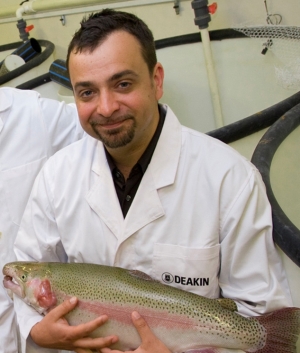Salmon expert reels in top nutrition medal
Research news
Deakin nutritionist Associate Professor Giovanni Turchini has been awarded one of the Nutrition Society of Australia’s (NSA’s) highest honours - the NSA annual medal, in recognition of his outstanding research in aquaculture and nutrition.
Associate Professor Turchini’s research has focussed on the production in fish of long chain omega 3 fatty acids, which are highly beneficial to humans for disease prevention.
The Associate Head of School (Warrnambool) within Deakin’s School of Life and Environmental Sciences, Associate Professor Turchini received the medal in Hobart at the annual scientific meeting of the NSA, which represents scientists and educators from diverse disciplines with a shared interest in nutrition.
Prof Turchini said he was particularly delighted to have been selected because he had felt “a bit of an outsider” in nutrition, working outside of Deakin’s Faculty of Health.
“It is the first time I have felt like a real nutritionist,” he joked. “I have always felt like more of a chemist, but my work is directly related to human nutrition.”
“I am super pleased that the NSA has recognised the very specific cellular metabolic point of view of my research and its connection to the big picture of global resource utilisation and sustainability,” he added.
His work has had a strong focus on the Atlantic salmon industry - Australia’s most significant sector of aquaculture.
“Aquaculture currently faces several significant challenges,” he explained. “The diet of farmed fish affects its nutritional value to humans and there is a global shortage of long chain fatty acid raw material that can be used as fish food.
“Long chain (omega 3) fatty acids are essential fatty acids, in terms of helping to prevent heart disease and stroke, controlling conditions such as eczema and rheumatoid arthritis, and playing protective roles against cancer and other conditions,” he explained.
“Fish oil from wild fish, such as sardines and anchovies, is fed to farm fish to provide the long chain fatty acids, but the available quantity is declining and long-term sustainability is at risk.”
He explained that he and his colleagues are taking a multi-pronged approach to addressing the problem, seeking ways to: optimise the use of available resources; find alternative sources, such as by-products from the meat, chicken and fishmeal industries; and increase the natural production of long chain omega 3s in farm fish through improved feed formulations and optimised feed management strategies.
Associate Professor Turchini joined Deakin 10 years ago from the University of Milan - and has thrived during his time here. He has received two ARC-funded Discovery fellowships, published extensively and undertaken numerous research projects funded by government agencies and private industry.
His research has spanned from nutrition (animal and human) to food quality, lipids, fatty acid and omega-3 metabolism, fish oil replacement and fatty acid metabolism in cultured aquatic species, to ethical issues within the fisheries and aquaculture sectors.
Share this story
 Nutritionist, Associate Professor Giovanni Turchini.
Nutritionist, Associate Professor Giovanni Turchini.
